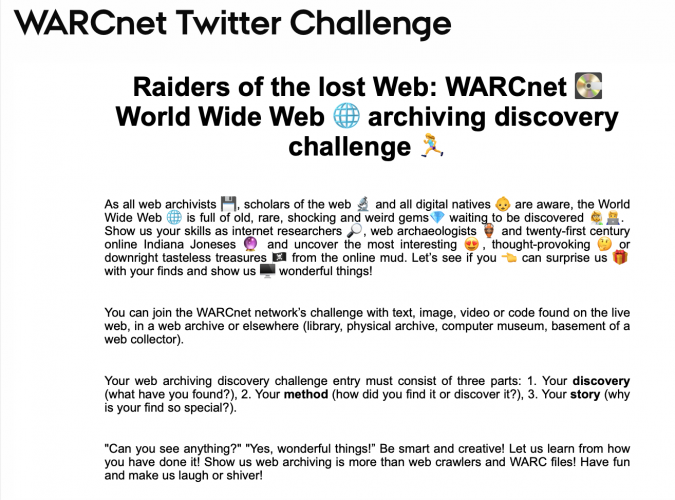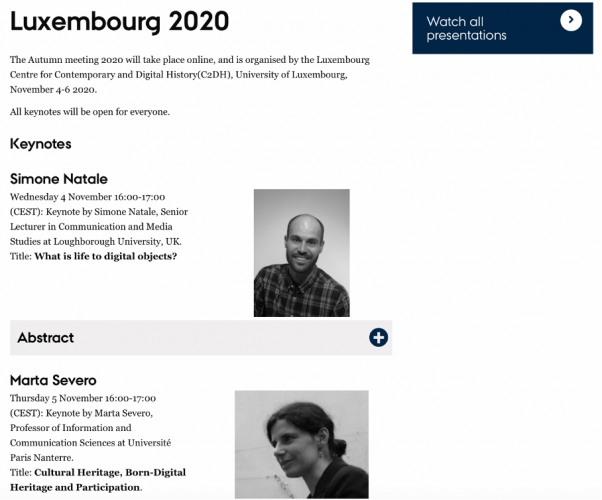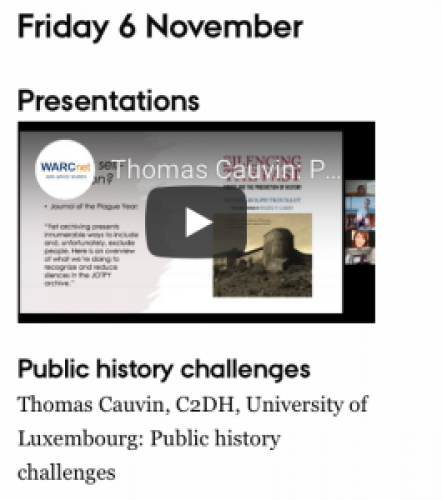Analysing transnational events
WARCnet
WARCnet, a European network dedicated to web archives
Following on from the pioneering efforts of the Internet Archive in preserving web content from 1996 onwards (see the Wayback Machine, with 486 billion archived web pages as of late 2020), the 2000s witnessed a growing interest in web archives, with institutions such as the Bibliothèque nationale de France and the British Library developing policies for the collection of this born-digital heritage. The movement gained further momentum in the 2010s, and many European countries, including France, Luxembourg, Denmark, the UK and Portugal, now have large collections of web archives. These collections not only represent a valuable source for the history of the Web and digital cultures; they are also of great interest for contemporary history in a broader sense, as they touch on all areas of our personal, civic and professional lives (economics, politics, culture and more).
At European level, despite the many benefits of archiving the Web, there are a number of challenges to be overcome, including access issues and the difficulties of transnational corpora, since each collection can often only be consulted within the institution that created it. Questions of interoperability, inclusion and exploration of these “big data”, as well as technical issues and choices that need to be made about scope and what content should be preserved, also need to be addressed. The collections also raise questions for researchers: what is the best way of compiling trans-European corpora? How can we compare national web domains over time by referring to the archived Web? How can we study an event at European level by drawing on web archives that have been compiled nationally? The aim of the WARCnet network is to explore these questions over the 2020-2022 period.
A team of researchers and web archivists
The WARCnet network, funded by the Independent Research Fund Denmark | Humanities (grant no 9055-00005B), is currently composed of around thirty members and eight web archiving institutions. Led jointly by Niels Brügger (School of Communication and Culture, Department of Media and Journalism Studies, Aarhus University), Valérie Schafer (C²DH, University of Luxembourg) and Jane Winters (School of Advanced Study, Institute of Historical Research, University of London), the network immediately set out to pool the expertise of researchers and people all over Europe who are involved in compiling these archives (https://cc.au.dk/en/warcnet/the-warcnet-team/).
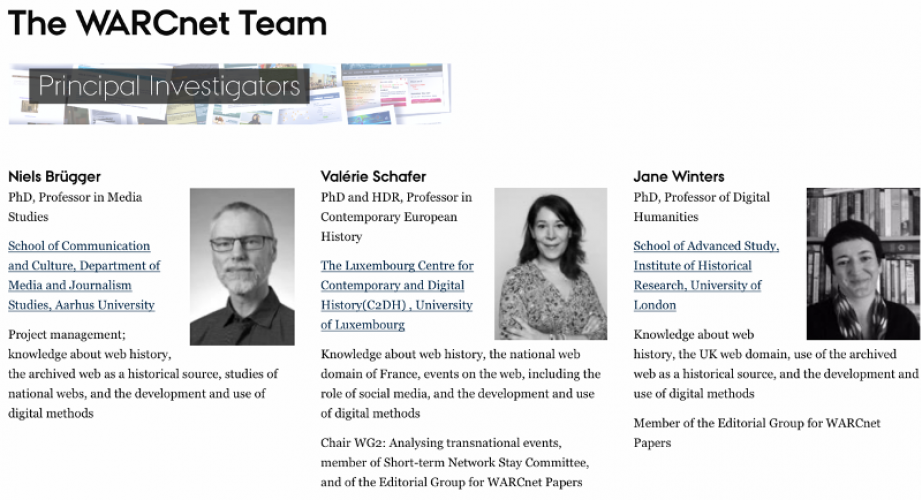
So alongside researchers in history, digital humanities, IT and political science, the team also includes members of the Bibliothèque nationale du Luxembourg, the Bibliothèque nationale de France, the French Institut national de l’audiovisuel and the Royal Danish Library, together with representatives of the International Internet Preservation Consortium.
The aim of WARCnet is to advance research on web archives, in particular by studying both the development of national web domains and digital traces of European events. It is organised into four working groups whose work is coordinated at twice-yearly meetings.
The two meetings in 2020 (Aarhus University and the University of Luxembourg)
In May 2020, the first event (launch meeting) for the entire network took place. It was organised by Aarhus University but held online because of the restrictions associated with the COVID-19 crisis. The meeting was an opportunity to identify the main issues and research phases for each working group and also to share events such as the keynote addresses by Ian Milligan and Matthew Weber, both of which gave rise to publications (see the WARCnet Papers).
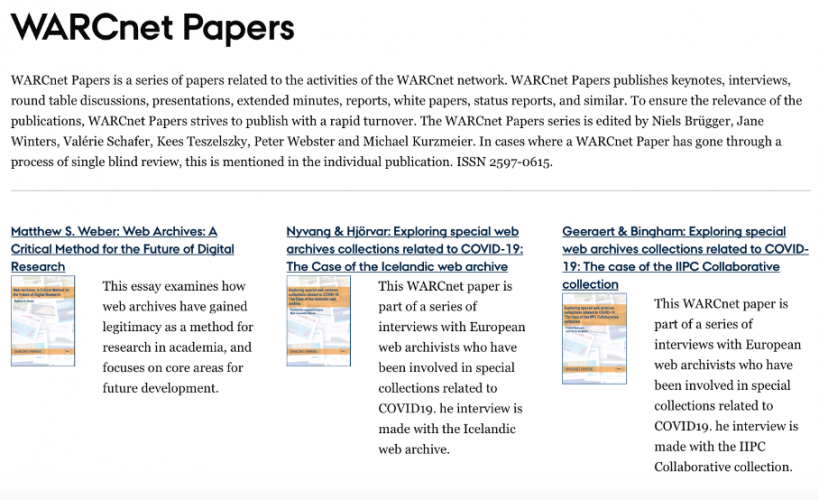
The C²DH hosted the second meeting, again online, over three days in November 2020 (https://cc.au.dk/en/warcnet/meetings/luxembourg-2020/). With keynotes by Simone Natale and Marta Severo and an address on the topic of public history by our colleague Thomas Cauvin (see the programme and the presentations), these days were also a chance to review the progress made by the different research groups and to coordinate our thinking and future action.
Valérie Schafer (C²DH), who coordinates the working group on transnational events, presented the latest progress in research on the COVID-19 crisis via web archives. The group has selected several research areas within the vast realm of possible subjects, with for example one topic on women, gender and COVID, another on musical creativity during COVID and a third on the “pandemic Web” before and during the COVID crisis. The group also conducted a series of oral interviews about web archiving during the health crisis and the various special collections set up over this period in many countries – from Luxembourg and Iceland to Hungary and Switzerland – which represent a unique pool of resources (see the WARCnet Papers).
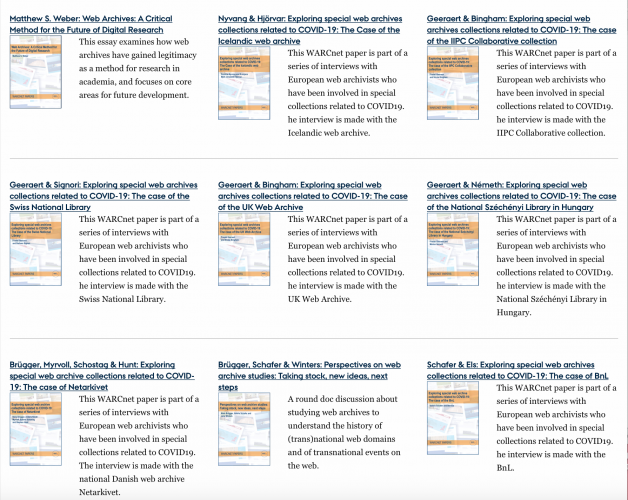
At the end of January 2021 an internal datathon will be held to explore these archives, or at least some related datasets and metadata (for example the BnL seed list). The next meeting in April 2021 in Aarhus will be an opportunity to present these results with a view to creating and sharing European corpora of web archives and further investigating transnational phenomena. It will also be an opportunity to pursue our Twitter challenge: Raiders of the lost Web!
